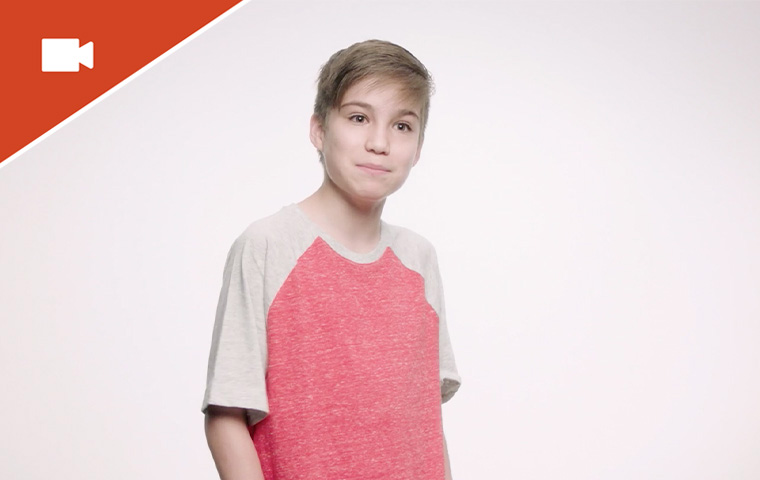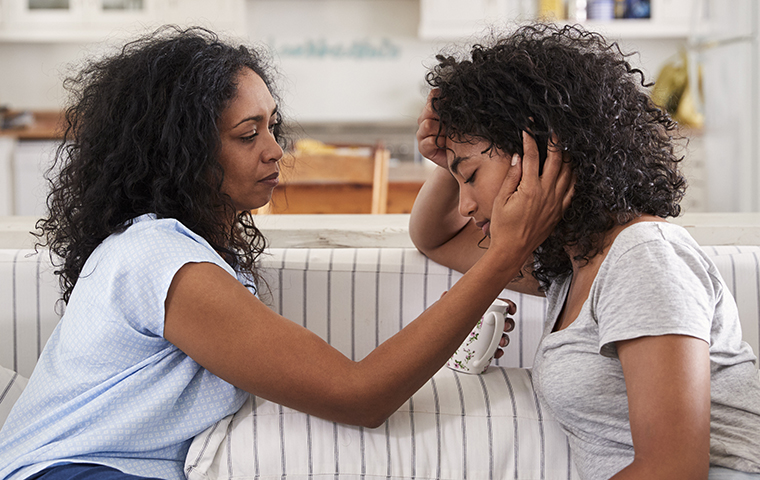Managing Your Teen’s Ups and Downs
By GetParentingTips.com staff
Read Time: 10 Minutes
The demands of parenting take a new turn when your child becomes a teenager. She (or he) is learning to think on her own, and she’s starting to have attitudes and opinions that may be different from yours. Her brain is continuing to develop, and she’s also dealing with raging hormones. She may become moody, argumentative, and hard to be around. She may talk back and refuse to follow your rules. She may prefer being with her friends rather than family. Welcome to being a parent of a teen!
Teenager Stress Today
Most of us can remember our challenging teen years and the conflicts we had with our parents. But we didn’t have many of the issues that kids face today, including online bullying, the threat of mass shootings, and the influences of social media. Add the short-term and long-term effects of a global pandemic and it’s no wonder kids have more teenage stress. It’s so important to help kids manage their teenage anxiety and their emotional changes during adolescence.
Licensed Professional Counselor Gives Tips On Parent-Child Power Struggles
Understanding Emotional Changes During Adolescence
You probably already know what a typical adolescent tantrum looks like when your teen doesn’t get her way: pouting, yelling, arguing, slamming doors, crying, acting aggressively, and being disrespectful, rude, or hurtful. You’ll probably find yourself dealing with regular emotional outbursts over what seems to be something minor, leaving both you and your teen frustrated and upset.
The good news is that this phase doesn’t last forever. The older your teenager gets, the more self-aware she’ll get as she learns how to tame her temper. Also, the impulse-control part of the teen brain becomes more fully developed with age. And even though it may be hard to reason with a teenager at times, just know that it’s not your fault. Teenager stress and teen anger are normal. The trick is finding ways to cope that work for both of you.

6 Reasons for a Teen’s Emotional Ups and Downs
A variety of things can contribute to the emotional changes that occur during adolescence. Between school, friends, family, a part-time job, and extracurricular activities, teens have a lot to deal with every day. And too often things don’t go their way. They may get a bad grade on a test they studied hard for. Social media may add intense pressure to how they feel about themselves and what is going on in their world. They may disagree with your rules and expectations. They might have conflicts with other kids at school. Any number of things in their everyday world can trigger teenager anxiety and make them upset and moody. It helps to keep in mind the things that can cause teenage stress and affect emotions and moods.
The Science Behind Teen Emotions
Does your teen go from being okay to upset in a matter of minutes? Does it seem to come out of nowhere? The swing is often due to hormones. Also, keep in mind that the front part of a teen’s brain is still developing—the part of the brain that controls reasoning and impulses. Because the teen brain is still developing, teenager stress can lead to anxiety or depression. Their changing bodies can make teens feel insecure or anxious about how they look. Teens may also develop their first strong romantic crushes.
Open communication, good nutrition, and adequate sleep can help your teenager’s brain grow and mature so that they can transition more successfully into adulthood. Learn more about how you can help your teen’s brain development.
Diet and Activity
It’s easy to forget that teenagers are still growing, which means that good nutrition and an active lifestyle are key to staying healthy and strong. Teens often skip meals or turn to fast food and junk food, so they may be missing out on the more nutritious, well-rounded diet their body needs. Physical activity counts too. Exercise helps release chemicals called endorphins, which may reduce stress hormones, improve mood, and reduce teenager anxiety. Physical activity also has other vital benefits, like building strong bones and muscles and controlling weight.
COVID-19 Depression
The global pandemic brought normal life to a screeching halt and took its toll on all of us. It’s been especially hard on teenagers because they haven’t yet developed the adult skills necessary for handling strong emotions like grief, fear, and hopelessness. When most school programs went online during the pandemic, kids were stuck at home and missed out on hanging out with their friends, playing sports, and being involved in other extracurricular activities. As they returned to a “normal” back-to-school routine, some teens experienced social anxiety or post-pandemic trauma associated with being in large crowds, and some may still struggle with these feelings Others also may be struggling academically to catch up on what they weren’t able to learn in a traditional classroom setting. For some teens, COVID-19 has increased the usual level of teenage stress and teen anxiety.
Need parenting help now?
The Texas Parent Helpline is available 24/7.
- Call 833-680-0611
- Chat with us
- Text 833-680-0611
Bullying at School and Online
According to a U.S. Department of Education report, one in five kids between the ages of 12 and 18 is bullied at school, and one in six deals with some form of cyberbullying. Wherever it happens, the result is the same: bullying is hurtful and harmful. The Centers for Disease and Control Prevention (CDC) found that students who experience bullying are at increased risk for depression, anxiety, sleep difficulties, lower academic achievement, and dropping out of school. With all the emotional changes during adolescence, teens may already have low self-esteem related to their appearance, social status, grades, or athletic ability, and that can lead acting out in a variety of ways.
Social Anxiety
It’s normal for teens to feel nervous about speaking in front of their class, competing in sports, or going on a first date. However, some teens develop more severe form of teenager anxiety—known as social anxiety disorder—which involves unusually intense thoughts and fears that affect their daily life. It might show up as constant feelings of worry, shame, or helplessness in social situations. All this stress can bring on physical symptoms like dizziness, shaking, shallow breathing, tension, and sweating. Social anxiety may cause a teen to lash out at school or home because they don’t know how else to deal with their emotions.
Performance Stress
Teen stress can also come from the pressure a teenager feels to do well in school and other activities. Teens may buckle under the weight of feeling the need to be an A student, or win every competition, or live up to other expectations they or someone else places on them. An important part of parenting today’s teens involves reassuring them that one bad performance or failure isn’t the end of the world, and no one is perfect. Your empathetic words can go a long way to put things in perspective and let your teen know you support her and will be there for her no matter what.

If you need help managing a situation with your teen, the Family and Youth Success Program can make a difference. Find a program near you.
Managing teenager anxiety, anger, and stress
How can you help your teenager manage big emotions and mood swings? Try some of the tips below.
Talk and listen.
Ask your teen if she knows why she is feeling a certain way—did something happen at school? Is she stressed out about anything in particular? Assure her that some teen anxiety is normal, and it’s ok to feel the way she does. Make sure she knows you’re always there to listen to any problem she may have.
Suggest that she talk to a school counselor or other responsible adult.
If your teen is having trouble explaining to you how she feels or she thinks you won’t understand, let her know it’s ok to talk to someone else. Discussing the issue with someone who is not as close to the situation is another way she can help understand and deal with her feelings.
Make sure she has a healthy routine.
This could include having consistent bedtime hours, eating nourishing meals, and having downtime after homework is done so she can relax. A set schedule she can often help ease typical teenage stress, too.
Encourage her to journal.
Putting her thoughts in writing can help your teen deal with stress and strong emotions. It can also give her a way to better understand why she feels the way she does.

Practice calming exercises.
Encourage her to try things that can help her relax like meditation, yoga, sitting outside and enjoying the sun, or slow breathing. These calming activities can help reduce teenager stress significantly.
Encourage her to be active.
Physical activity can help reduce stress. You can do it together or encourage her to enjoy it alone. It can be as simple as going for a walk, riding her bike, or dancing in her room.
Give your teen your full attention.
If you’re interacting with your teen, put your phone away. No email or text is more important than showing her that you’re focused on her and want to hear what she has to say without any distraction.
Tackle bullying head on.
If you think your teen is being bullied, ask her about it. Ask whether there is anyone giving her a hard time and if so, what are they saying or doing? Be supportive and talk about possible ways to handle bullying. If it doesn’t stop, gets worse, or you see physical or emotional signs your teen is being harmed, then it’s time to talk to a teacher or principal.
Could it be social anxiety? If you think your teenager may be suffering with social anxiety, you can help by encouraging her to work through her fears by taking part in situations that make her anxious. She can start with small steps like talking to someone new at school, making a new friend, or going to a school event.
What to do when an angry teenager has a meltdown
You never know when something will trigger your teen. So, how can you manage the situation in the heat of the moment and get to the bottom of what’s really upsetting her?
Pick your battles.
It can be hard to tell the real reason for the outburst when your teen is ranting and raving. Do your best to stay calm so the situation doesn’t get worse. Calmly ask her to lower her voice and tell you what is going on. Help her bring the emotion level down so she can share why she is so upset.
Validate your teen’s feelings.
When your teen is upset, be sure to acknowledge her feelings so she knows you’re there to help her. You don’t have to always agree with what she’s saying, but it’s important that she understands she has a safe place to share her frustrations or concerns.
Set boundaries.
If your angry teenager’s behavior is affecting the whole family, it’s time to remind her of what is and isn’t appropriate. She needs to be respectful of everyone’s feelings and not just focus on her own. Teens are more likely to follow rules when they feel they are part of setting them. If possible, work together to find compromises to the challenges you are facing.

Be clear and consistent.
We know that emotional changes and outbursts during adolescence are normal. The key is to be consistent in how you deal with the situations. When your teen lashes out, your best bet is to stay calm yet firm and do so consistently. Your teen will learn that you’re willing to talk things through but won’t let her get away with rude or unacceptable behavior.
Stay involved.
Staying engaged with your teen will show her that she’s always welcome to talk to you about her problems. Being empathetic is important—it will reassure her that you’re always there for her and will support her when she’s struggling or feeling down.
Be a good example.
The best way to teach your teen how to deal with life’s challenges is to show through your own actions how to deal with problems and treat others with respect. When your teen is upset, treating her with honesty, kindness, and respect goes a long way. If she is being rude, calmly but firmly remind her it’s not okay. Keeping a cool head when she has an outburst goes a long way toward showing your teen what acceptable behavior looks like.
Know when to walk away.
Sometimes your angry teenager might just need some alone time to deal with how she’s feeling. If she needs space, give it to her. Nagging or insisting on hearing why she’s upset might have the opposite effect and make her even angrier. Being respectful of others and giving them space when they need it is something a parent should model.

Signs Teens May Need Professional Help
It’s a given that teens will show a certain amount of anger, stress, and frustration. But how can a parent tell when a teen might need professional help? Here are signs to look for:
- Threatening to hurt others.
- Self-harm, such as cutting, drug or alcohol use, or physically or sexually risky behavior.
- Isolating themselves. This may include skipping class, staying in their room all the time, avoiding friends, or withdrawing from usual activities.
- Changes in usual behavior, such as becoming listless, sad, or depressed.
- Abusing others emotionally. That could include bullying, taunting or threatening others, or acting in ways that upset their family, boyfriend or girlfriend, friends, classmates, or team members.
- Difficulty concentrating or making decisions.
- Constant feelings of sadness, worry, anxiety, anger, fear, or hopelessness.
- Talking about death or expressing suicidal thoughts.
Where to Find Professional Help
If you think your teenager’s behavior might be abnormal, there could be underlying issues that a licensed professional could help address. The National Alliance on Mental Illness (NAMI) is a good resource to learn more, find support, and get guidance on how to help your teenager deal with the issue.
Hang in there
As today’s teens struggle to determine who they are and how and where they fit in, our job as parents is to guide them. The number one thing they need is a loving, caring, reliable adult. Listening, showing kindness and respect, providing steady support, and suggesting healthy activities—all while setting boundaries—can help you teach your teen the skills she needs to manage her feelings. Just remember: the older she gets, the wiser she’ll get. And you may get some credit for knowing a few things too.




